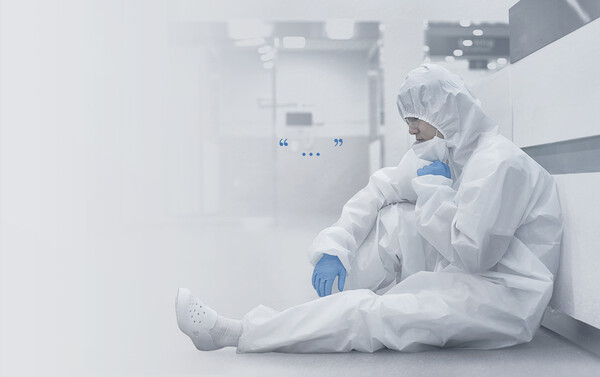"What the hell are we supposed to do?"
Many in the medical community said so after the government decided to stop reimbursing Covid-19 treatments and sharply reduce the number of people who can be tested with reimbursement from August.

The critics said the government would end up abandoning Covid-19 patents when hospitals are not ready to absorb them into the general medical system.
The Ministry of Health and Welfare held the Health Insurance Policy Review Committee on Wednesday and decided to phase out the Covid-19 response reimbursement. Accordingly, it will maintain subsidies for hospitalization fees for isolation rooms and integrated quarantine management fees for Covid-19 patients only until August.
It also will discontinue providing support for nursing home isolation rooms and eliminate infection prevention and control fees and medication safety fees for home treatment.
The committee also decided to maintain Covid-19-related emergency care, childbirth, and operation reimbursement only through December. It will pay reimbursement for hemodialysis until December but with a reduced addition rate of 200 percent to 100 percent.
Support for Covid-19 tests will remain for high-risk individuals and at vulnerable facilities, such as emergency rooms, intensive care units, nursing homes, and psychiatric hospitals. On the other hand, general hospitalized patients and those with symptoms will have to pay for their tests.
‘A frustrating situation of leaving people on their own’
Medical field workers heaved a collective sigh upon the news of the committee’s decisions. "All committee members who voted to terminate the Covid-19 reimbursement should resign," an angry medical worker said.
The radical reaction reflected the medical professionals’ consensus that the government had discontinued Covid-19 support without creating conditions for them to be treated in the general medical system. The critics pointed out that this would inevitably lead to reluctance to treat Covid-19 patients.
The expected fall in Covid-19 tests will also increase concerns about the spread of infection within hospitals, they said.
"This is like telling us not to do anything. If a Covid-19 patient comes in, we have to isolate them, but only at our own expense. Or, patients will have to suffer," said Dr. Uhm Jung-sik, a professor of infectious diseases at Gachon University Gil Medical Center, in a telephone interview with Korea Biomedical Review on Thursday. "They seem to think that Covid-19 is gone just because they can't see it."
Citing that the government said it would treat Covid-19 like influenza, Uhm noted that even influenza has restrictions on tests and prescriptions before the government issues a warning, giving challenges to the medical field.
The government says it would focus on the high-risk group, but he said there's always a “gray zone,” adding that some patients are not at high risk but need screening.
"Doctors should be able to conduct Covid-19 tests with health insurance coverage if necessary. Only then will patients receive tests willingly,” he said. “The government also says it will create a culture where people can rest when sick. However, it has drastically reduced the chances of getting tested. It's a frustrating situation that reminds me of ‘leaving people on their own.’”
Flu persists amid resurgent Covid-19; masking advice must continue
Dr. Lee Hyuk-min, a professor of diagnostic laboratory medicine and the head of infection control at Severance Hospital, pointed out that the government only emphasizes a shift to the general medical system without preparations. He noted that there are no conditions for isolating and managing patients with respiratory infectious diseases, including Covid-19, and there is no preparation for a "twin pandemic" of Covid-19 and influenza.
Lee expressed particular concerns about the government’s emphasis on lowering quarantine levels in the face of a resurge in Covid-19 cases and a continuous influenza spread.
According to the Korea Disease Control and Prevention Agency (KDCA), the number of Covid-19 cases in the third week of July jumped 35.8 percent from the previous week. The number of new cases rose to 40,000 for the first time in six months, with an increase in cases among people aged 60 and older and a 16.4 percent jump in severe cases.
The influenza epidemic also continues. The KDCA said the number of influenza cases has increased for three consecutive weeks, prompting the agency to call for personal hygiene practices on Tuesday.
"In Europe, which relaxed prevention measures, such as social distancing, earlier than we did, the influenza epidemic in 2022 lasted all summer and increased to the previous year’s levels,” Professor Lee said. "Influenza is a respiratory disease, so it will be affected by how well people wear masks. If the number of influenza cases returns to pre-Covid-19 levels, it should be managed as a 'twin pandemic,’”
In such a situation, hospitals are forced to discontinue selective tests, he noted, adding that the recommendation to wear masks is not accepted well, with some people regarding the situation as a complete removal of quarantine measures.
Lee emphasized that medical institutions should be allowed to issue mask mandates within hospitals.
Lee also stressed the need to support converting intensive care units to single-occupancy rooms. He added that if a patient is diagnosed with Covid-19 and needs to be admitted to the ICU, they need a separate place to stay.
"The reality is that not all ICUs can be single-occupancy spaces due to staffing problems. In that case, only the ICUs for respiratory patients should be single-occupancy rooms,” he said. "The government should support medical institutions to reorganize ICUs into single rooms so that Covid-19 patients can be included in the general medical care system."

